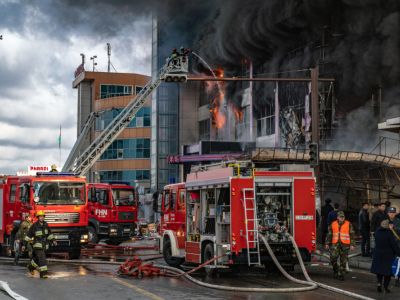Hope remained Saturday that Israeli Foreign Minister Shimon Peres and Palestinian President Yasser Arafat would still meet, despite Israeli Prime Minister Ariel Sharon's abrupt cancellation of a previously planned meeting.
The United Nations, the United States and Russia led renewed efforts to secure the long-anticipated dialogue, and Peres was scheduled to make a late appeal to Sharon to reverse the cancellation.
Haaretz newspaper quoted sources close to Peres as saying that Sharon had not discussed the matter with the foreign minister before reaching a decision.
According to the sources, Sharon decided to cancel the meeting because he felt it would be damaging to Israel if it was held at this time.
But pressure was apparently being placed on the hawkish prime minister to change his mind and allow the meeting to take place, with the aim of discussing a ceasefire.
Sharon told US President George W. Bush of his decision to cancel the meeting in a phone conversation Friday. Although Bush told Sharon that he hoped the prime minister would allow the meeting to go forward, Sharon explained that he believed that holding the meeting at the present juncture would harm Israel's interests.
UN special envoy to the Middle East Terje Roed-Larsen said Saturday he hoped a meeting would take place "as soon as possible," according to AFP.
Roed-Larsen, who met with Arafat late Friday after earlier talks with Peres, said he received a commitment from the Palestinian president that he would order all branches of the Palestinian security services to ensure all agreements with Israel "are fully implemented and to prevent any violations."
Arafat later met with senior officials of his security forces and urged them "not to give Israel reasons to continue its aggression," security sources told AFP.
UN Secretary General Kofi Annan has also been in contact with Arafat and Peres, Roed-Larsen said in a statement, adding the long-delayed meeting "could be the last chance to end the fighting" and needed to be well prepared.
AFP said also that Russian Foreign Minister Igor Ivanov had spoken with Sharon Friday night by telephone but failed to convince him to go through with the meeting.
In Washington, US Secretary of State Colin Powell said it was still important for the Israeli-Palestinian meeting to take place.
"We believe a meeting is important to get the process started," Powell told reporters.
"This (Mideast) conflict isn't going away, and I don't think it's going to be solved by continuing conflict between the two sides."
The Palestinian leadership Friday repeated charges that Israel was using the tragedy in the United States to step up what Arafat aide Nabil Abu Rudeina said a day earlier was its "war of attrition" against the Palestinians.
"While the world is preoccupied with the terrorist acts that targeted New York and Washington, the Israeli government is trying to profit from these events by accelerating its escalation," said a statement from the Palestinian leadership.
"The forces of occupation have stiffened their attacks against Palestinian cities, destroying numerous buildings, while several martyrs have fallen," the statement added.
Israeli forces carried out incursions into Ramallah in the West Bank and Beit Hanoun overnight, and two Palestinians were killed during clashes at Khan Yunis in the southern Gaza Strip, Palestinian security sources said Saturday.
In Ramallah, three members of the Palestinian forces and two Israeli soldiers were wounded during intense gunfire when Israeli troops and tanks moved into the city, Palestinian security sources said.
The Israeli army denied that it had entered Ramallah. However, it said its forces came under fire south of the city and had returned fire, without any casualties resulting.
The army did confirm the incursion into Beit Hanoun, where five Palestinians were reported wounded.
On Saturday morning, as calm returned to Ramallah and Beit Hanoun, a third incursion took place at Qarara in the southern Gaza Strip with tanks and bulldozers moving 500 meters (yards) into autonomous Palestinian territory, Palestinian security sources said. No injuries were reported.
The latest deaths bring to 805 the number of people killed since the outbreak last September of the Palestinian Intifada, or uprising, including 617 Palestinians and 165 Israelis, according to AFP estimates – Albawaba.com
© 2001 Al Bawaba (www.albawaba.com)









